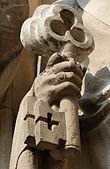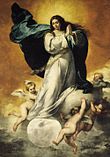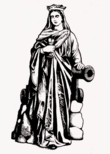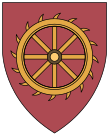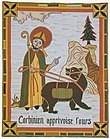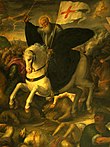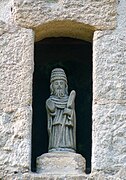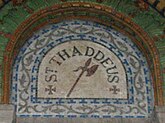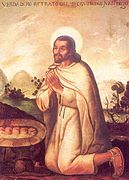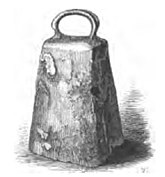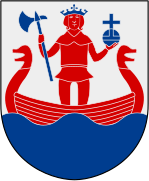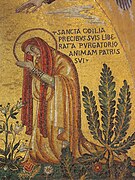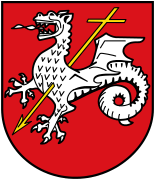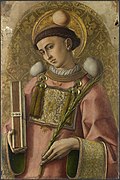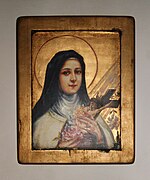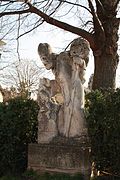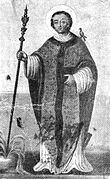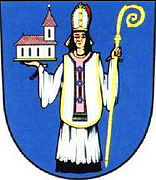From Wikipedia, the free encyclopedia
Attribute identifying a saint in artworks
Dutch Book of Prayers from the mid-fifteenth century. Group of five saints. From left to right, Saint Joseph , Saint James the Great , Saint Eligius , Saint Hermes , and Saint Ghislain , with their emblems. Symbolism of Christian saints has been used from the very beginnings of the religion.[ 1] saint is said to have led an exemplary life and symbols have been used to tell these stories throughout the history of the Church.[ 2] saints are traditionally represented by a symbol or iconic motif associated with their life, termed an attribute or emblem , in order to identify them. The study of these forms part of iconography in art history .[ 3] [ 2]
Attributes often vary with either time or geography, especially between Eastern Christianity and the West. Orthodox images more often contained inscriptions with the names of saints, so the Eastern repertoire of attributes is generally smaller than the Western. Many of the most prominent saints, like Saint Peter and Saint John the Evangelist can also be recognised by a distinctive facial type. Some attributes are general, such as the martyr's palm .[ 4]
Four Evangelists
The symbols of the four Evangelists are here depicted in the Book of Kells . The winged man, lion, eagle and bull symbolize, clockwise from top left, Matthew , Mark , John , and Luke .
The Apostles
Depictions of The Apostles
The
Synaxis of the Twelve Apostles. Russian, 14th century, Moscow Museum.
The
key as symbol of St. Peter
Stained glass window showing flaying knife, symbol of St. Bartholomew
Scallop Shells, St. James the Great
Saint
Symbol
Andrew
St. Andrew's cross [a]
Bartholomew the Apostle
knife , bears his own skin in hand][a]
James, son of Zebedee
pilgrim's staff , scallop shell , key , sword , pilgrim's hat , astride a white charger, Cross of Saint James [a]
James, son of Alphaeus /James the Just
square rule , halberd , club , saw [a]
John
evangelistary , a serpent in a chalice, cauldron, eagle[a]
Jude
sword , square rule , club , ship [a]
Judas Iscariot
thirty pieces of silver [a]
Matthew
angel , evangelistary[a]
Peter
Keys of Heaven , boat , fish , rooster , pallium, papal vestments; crucified head downwards on an inverted cross , holding a book or scroll. Iconographically, he is mostly depicted with a bushy beard and hair.[a]
Philip
column; holding a basket of loaves and a Tau Cross [a]
Simon
boat; cross and saw ; fish (or two fishes); lance; being sawn in two longitudinally; oar [a]
Thomas
placing his finger in the side of Christ, axe , spear , carpentry tools [a]
Depictions of Mary, mother of Jesus
A traditional depiction of Mary by
Fra Angelico wearing a blue mantle
Mary is often portrayed wearing blue . Her attributes include amongst many others a mantle (often in blue or very large to cover the faithful), crown of 12 stars , serpent, sun and/or moon, heart pierced by sword, Madonna lily , roses , and rosary beads.[ 6]
Saints listed by name
A
Saint
Symbol
Acathius of Melitene crown of thorns [a]
Adalbert spears[ 7]
Agatha of Sicily tongs or shears , veil , bells , two breasts on a plate [a]
Agnes lamb [a]
Anastasia cross , medicine pot, palm branch [a]
Alfege of Canterbury axe [a]
Alfred the Great codex , crown , orb /scepter [a]
Ambrose bees , beehive , dove , ox , pen [a]
Anne, grandmother of Jesus door , book [a] [ 8]
Anthony the Great monk's habit , bell , pig , T-shaped cross [a]
Anthony of Padua Christ Child , bread , book , white lily [a]
Athanasius of Alexandria bishop arguing with a pagan, bishop holding an open book, bishop standing over a defeated heretic [a]
Augustine of Hippo dove , child , shell , pen , book [a] heart with a flame
B
Saint
Symbol
Barbara tower (often with three windows), chalice , ciborium , cannon [a]
Barnabas pilgrim's staff , olive branch [a]
Benedict broken cup , raven , bell , crosier , bush [a]
Benno of Meissen fish with keys in its mouth, book [a]
Bernard of Clairvaux pen , bees , instruments of the Passion [a]
Bernardino of Siena tablet or sun inscribed with IHS , three mitres [a]
Blaise wax , two crossed and lit candles, iron comb [a]
Bonaventure communion , ciborium , cardinal's hat [a]
Boniface oak , axe , book , fox , scourge , fountain , raven , sword [a]
Brendan the Navigator whale; priest celebrating Mass on board a ship while fish gather to listen; one of a group of monks in a small boat [a]
Bridget of Sweden book , pilgrim's staff , habit of the Bridgettines [a]
Brigid of Kildare cow , crosier , Brigid's cross [a]
C
Saint
Symbol
Casimir of Poland and Lithuania royal attire of crown and red robe lined with ermine, white lily , cross , rosary ; sometimes two right hands[a]
Catherine of Alexandria breaking wheel , crown , sword, book[a]
Catherine of Ricci ring , crown , crucifix [a]
Catherine of Siena stigmata , cross , ring , lily , habit of the Dominican order [a]
Cecilia organ or other musical instrument, martyr's palm , roses, sword[a]
Cerbonius geese [a]
Charles Borromeo cardinal's robes , the Eucharist [a]
Christopher giant crudely dressed, torrent, tree , branch or large staff, carrying the Christ Child on shoulder[a]
Clare of Assisi monstrance or ciborium , habit of the Poor Clares [a]
Clare of Montefalco cross [a]
Clement anchor , fish ,[a] Mariner's Cross [b]
Corbinian bear with a packsaddle [ 9]
Saints Cosmas and Damian a phial , box of ointment [a]
Saints Crispin and Crispinian shoes , millstones [a]
Cyriacus deacon's vestments [a]
D
Saint
Symbol
Daniel lions [a]
David of Scotland king with sword or sceptre [a]
David of Wales dove [a]
Demetrius Depicted wearing the armor of a Roman soldier , usually carrying a spear, often seated on a red horse[a]
Denis head in hands [a]
Dominic rosary [a] star , dog with a torch[ 10]
Dominic de la Calzada hen and rooster , habit of a hermit , prayer beads , shepherd's crook [b]
Dorothea of Caesarea basket with flowers or fruits [ 11]
Dunstan hammer , tongs [a]
Dymphna crown , sword , lily , lamp , princess with a fettered devil at her feet[a]
E
Saint
Symbol
Earconwald bishop travelling in a chariot [a]
Edmund the Martyr quiver of arrows [a]
Edward the Confessor king crowned with a nimbus and holding a sceptre [a]
Saint Eligius bishop portrayed with a crosier in his right hand, on the open palm of his left a miniature church of chased gold; with a hammer , anvil , and horseshoe ; or with a horse [a]
Elijah habit and mantle of the Carmelites , cave , scroll, chariot of fire[a]
Elisabeth of Hungary alms , flowers , bread , the poor , pitcher [a]
Elisabeth of Portugal crowns , roses, habit of a Third order Franciscan sister, crucifix[a]
Emeric sword, lily[ 7]
Emilianus riding into battle in the robe of a hermit [a]
Erasmus of Formiae windlass [a]
Eric of Sweden king being martyred at Mass [a]
Eustace hunting clothes , shining cross or crucifix between the antlers of a stag , bull, horn , oven [a]
F
Saint
Symbol
Faith cross, gridiron, rods, sword[a]
Felix of Burgundy anchor [a]
Fiacre spade , basket of vegetables[a]
Florian Cross of Saint Florian ; Armour of a Roman soldier; pitcher of water; pouring water over fire[ 12]
Florinus of Remüs bottle , glass of wine [a]
Fourteen Holy Helpers Saints Acacius, Barbara, Blaise, Christopher, Cyriacus, Catherine of Alexandria, Denis, Erasmus of Formiae, Eustace, George, Giles, Margaret of Antioch, Pantaleon, and Vitus, shown as a group.[b]
Francis of Assisi habit of the Franciscans , wolf , birds , fish , skull , stigmata [a]
Francis Xavier crucifix , bell , vessel , crab with a crucifix[a]
G
Saint
Symbol
Gabriel Archangel ;[ 13] [ 14] [ 14] [ 14] scroll stating "Ave Maria Gratia Plena" [ 15] [a]
Gall abbot's garment and crozier, blessing a bear that brings him a log of wood; may be shown holding a hermit's tau staff with the bear or carrying a loaf and a pilgrim's staff.<[ 16]
Genesius theatre mask [a]
Genevieve lit candle , bread , keys , herd , cattle [a]
George dragon , soldier or knight in armour , often on white horse, especially in the East, Cross of Saint George [a]
Gerard of Csanád Bishop being killed by a spear[a]
Gertrude of Nivelles crown , tapir , lily , mouses and cats [a]
Gervasius and Protasius the scourge , the club and the sword [b]
Giles Benedictine habit , hind [a]
Godelieve crown, well, being strangled[b]
Gotthard of Hildesheim dragon; model of a church[ 17]
Gregory the Great papal tiara , crosier , dove (often portrayed at his ear)[a]
H
Honoratus of Amiens with a
peel
Saint
Symbol
Helena wearing a royal crown while supporting a cross [a]
Hermann Joseph kneeling before a statue of the Virgin and Child and offering an apple[a]
Hermenegild axe, crown, sword, and cross [b]
Hilary of Poitiers episcopal vestments, crozier, beard, usually white and often long[b]
Hildegard of Bingen habit of a Benedictine nun, crozier, with flames above her head, writing in her Liber Scivias , sitting in a hermitage [b]
Hippolytus of Rome papal tiara [a]
Hippolytus the soldier military garb , horse's harness [a]
Honoratus of Amiens baker's peel or shovel; bishop with a large Host ; bishop with three Hosts on a baker's shovel; loaves[a]
Hugh of Lincoln episcopal vestments, crozier, swan [a]
Humility habit of the Vallombrosians [a]
Hyacinth of Poland statue of the Blessed Virgin Mary; monstrance or ciborium [b]
I
Saint
Symbol
Ignatius of Antioch bishops vestments, surrounded by lions or in chains [a]
Ignatius of Loyola Eucharist , chasuble , book often inscribed with Ad majorem Dei gloriam IHS with a cross across the h (traditionally with three nails below the letters, and the letters and nails surrounded by the sun's rays), sword , cross, biretta [a]
Imerius of Immertal hermit's garb and bird of prey[a]
Indaletius miter, staff and a book in his hands
Irene of Rome tending to Saint Sebastian
Irene of Tomar martyr's palm [a]
Irmengard of Chiemsee crozier of an abbess, flaming heart, Benedictine habit, crown
Isaiah An old man with gray hair and beard holding a scroll with words from Isaiah 7:14 , (in Latin) ecce virgo concipiet et pariet filium et vocabitur nomen eius Emmanuel (behold, a virgin shall conceive and bear a son, and his name shall be Emmanuel)[b]
Isidore the Laborer peasant holding a sickle and a sheaf of corn, a sickle and staff, as an angel plows for him; or with an angel and white oxen near him. In Spanish art, his attributes are a spade or a plough.[ 18]
Isidore of Seville bees , pen , book[a]
Ivo of Kermartin depicted as a lawyer , holding a document, in legal dress.[a]
J
Saint
Symbol
James the Less carpenter saw , fuller's club
Jerome hermitage, lion , hermit wearing a cardinal's galero , vestments of a cardinal, cross , skull , books and writing material , stone in hand[a]
Joan of Arc shield , armament , Cross of Lorraine [a]
Saint Joanna lamb [a]
John Berchmans Rule of Saint Ignatius , cross , rosary [a]
John Chrysostom bees , dove , pen [a]
John of God alms , heart , crown of thorns [a]
John the Baptist lamb , head on a platter , animal skin (the camel-skin coat of the Gospels), pointing at Christ or a lamb, often portrayed carrying a long crudely made cross[a]
Joseph of Anchieta Gospel book , crucifix and Walking stick [a]
Joseph, spouse of Mary Christ Child , white lily , rod, plane , carpentry square , often brown robe and/or mantle [a]
Juan Diego tilmàtli [a]
Justin Martyr axe , sword [a]
Justina of Padua martyr's palm , knife , unicorn [a]
Juthwara round soft cheese , sword [a]
K
L
Saint
Symbol
Lambert of Maastricht martyr's palm [a] [b]
Lawrence of Rome cross , evangelistary , gridiron , martyr's palm , purse of money , dalmatic , accompanied by a group of poor people.[b]
Lorenzo Ruiz Rosary in clasped hands, gallows and pit, barong tagalog and black trousers, cross , martyr's palm [a]
Leander of Seville pen [a]
Leonard of Noblac lock , chain , manacles or fetters [b]
Liborius of Le Mans pebbles , peacock [b]
Longinus Roman soldier's attire, lance[b]
Louis IX of France royal attire of crown and blue robe decorated with golden fleur-de-lis , crown of thorns , nails [b]
Louis Bertrand a chalice containing a snake [b]
Louis of Toulouse silk gloves and a richly embroidered cape with a jeweled clasp at the neck[b]
Lucy robe of a virgin, with her eyes on a plate, lamp , sword [a]
M
Saint
Symbol
Margaret of Scotland reading the bible[a]
Margaret the Virgin dragon , sometimes in chains, cross, hammer[a]
Maria Goretti fourteen white lilies; humble clothing; (occasionally) a knife[a]
Martha aspergillum , dragon [a]
Martin of Tours geese ; armament of a Roman soldier, sharing his cloak with a beggar[a]
Martin de Porres broom , a cat , dog and a mouse eating from the same plate[ 7]
Mary Magdalene jar of ointment , long hair, washing Christ's feet, skull, crucifix, red egg [a]
Matilda purse , alms [a]
Maurice soldier in armour , banner with red cross [a]
Maurus scales , spade , crutch [a]
Menas of Crete two camels [a]
Michael scales , banner , sword , dragon [a]
Monica girdle , tears [a]
N
Saint
Symbol
Neot fish [a]
Nicholas three golden balls or purses or small treasure cheasts, often on a book, bishop's vestments, crozier, anchor , boat , children, wheat sheaves[a]
Nicholas of Tolentino Augustinian holding a bird on a plate in the right hand and a crucifix on the other hand; holding a basket of bread, giving bread to a sick person; holding a lily or a crucifix garlanded with lilies; with a star above him or on his breast[b]
Nicolás Factor Franciscan habit, skull, fire [b]
Pope Nicholas I rooster [ 20]
Ninian clogrinny, or the Bell of St. Ninian[a]
Norbert of Xanten monstrance , cross with two beams [a]
O
Saint
Symbol
Obadiah as a prophet with the index finger of his right hand pointing upward[b]
Oda of Scotland depicted wearing a long blue gown with one shoulder bare; usually carries a staff or a book; always shown with a magpie on her hand and a crown under her feet[a]
Odile of Alsace Abbess praying before an altar; woman with a book on which lie two eyes; larkspur [b]
Olaf of Norway crown, axe, standing in a Viking boat[a]
Onuphrius old hermit dressed only in long hair and a loincloth of leaves; with an angel bringing him the Eucharist or bread; hermit with a crown at his feet
Opportuna of Montreuil depicted carrying an abbess's crozier and a casket of relics . She may also be shown with the Virgin appearing at her deathbed or as a princess with a basket of cherries and a fleur-de-lys [ 21]
Osgyth represented in art with a stag behind her and a long key hanging from her girdle, or otherwise carrying a key and a sword crossed, a device which commemorates St. Peter, St. Paul and St. Andrew[ 22]
P
Saint
Symbol
Pancras sword , martyr's palm [a]
Pantaleon nailed hands [a]
Patrick cross , harp , serpent , baptismal font , demons , shamrock [a]
Paul the Apostle sword , book or scroll , horse ; long, pointed beard, and balding backwards from forehead.[a]
Peter of Saint Joseph de Betancur bell , Franciscan habit and spear canary pastor .[a]
Pedro Calungsod martyr's palm , spear , bolo , doctrina christiana book , rosary , christogram , crucifix [a]
Pancras sword , palm branch [a]
Petronilla broom and/or a set of keys, dolphin [a]
Philip Neri white lily [a]
Philomena anchor , martyr's palm , crown of roses, arrows[a]
Q
Saint
Symbol
Quentin depicted as a young man with two spits; vestments of a deacon ; with a broken wheel; with a chair to which he is transfixed; with a sword or beheaded, a dove flying from his severed head[a]
Quiricus depicted as a naked child riding on a wild boar[a]
Quirinus of Malmedy Vestments of a priest celebrating Mass, dragon[ 23]
Quirinus of Neuss military attire; knight with lance, sword, hawk; banner or sign with nine balls[a]
Quirinus of Sescia millstone hanging from his neck[b]
Quiteria depicted with a dog on a lead; depicted with her head in her hands, emerging from the sea.[a]
R
Saint
Symbol
Raphael (archangel) fish , walking stick, leading Tobias by the hand[b]
Raymond Nonnatus A Mercedarian friar wearing a cardinal's red mozzetta , holding a monstrance and a martyr 's palm branch [b]
Raymond of Penyafort skimming across the sea with his cape as both boat and sail[b]
Remigius dove, book, lamp[b]
Reparata martyr's crown and palm; a dove; a banner with a red cross on a white field; sometimes depicted with St. Ansanus [ 24]
Richard bishop with overturned chalice [a]
Rita of Cascia roses , roses and figs , crucifix , thorn , robe of a widow or Augustinian habit sometimes with a wound or the marks of a thorn crown on her forehead[a]
Roch angel , dog with bread, showing his plague mark, pilgrim's dress[a]
Rosalia of Palermo being crowned by the Divine infant with roses, cross, book, or skull, lilies, chisel, hammer[b]
Rose of Lima crown of thorns , anchor , city , roses , crown of roses, sometimes wearing habit of the Dominican order [a]
Rufina and Justa a model of the Giralda ; earthenware pots, bowls and platters; books on which are two lumps of potter's clay; palm of martyrdom ; lion[b]
S
Saint
Symbol
Sativola scythe , well [a]
Sava of Serbia book [a]
Saint Scholastica habit of a Benedictine nun , dove , Rule of St. Benedict , crozier of an abbess [b]
Seraphim of Sarov Wearing peasant clothing, often kneeling with his hands upraised in prayer crucifix worn about his neck, hands crossed over chest[a]
Sebastian arrows , crown [a]
Spyridon of Corfu bishop with Gospel ; long, pointed beard, and wearing a shepherd's hat [a]
Stanislaus of Szczepanów bishop's vestments and insignia, sword [a]
Stanisław Kazimierczyk Canon's attire[a]
Stephen the Martyr vestments of a deacon , stone(s), martyr's palm [a]
Stephen of Hungary ttire of a King, and holding an orb or a sceptre with double cross [ 7]
Swithun bishop with bridge , broken eggs [a]
T
Christ with Saint Teresa of Avila, holding a thorn in order to pierce her heart
Saint Therese of Lisieux with her attributes
Saint
Symbol
Teresa of Ávila habit of a Carmelite nun , holding a (fiery) pen, pierced heart , arrow [a]
Teresa of the Andes habit of a Carmelite nun , crucifix, crown of flowers [a]
Teresa Benedicta of the cross habit of a Carmelite nun (sometimes with a yellow badge ), cross, martyr's palm , book, Hebrew scroll, holding a tallit , burning bush
Theodore crocodile [a]
Thérèse de Lisieux many roses , sometimes entwining a crucifix [a]
Thomas Aquinas monstrance , golden sun on his breast, dove , ox [a]
Thomas Becket sword , and wearing chancellor's robe and neck chain[a]
Thomas More axe [a]
Timothy three stones and a clubclub and stones; broken image of Diana [ 25]
Trudpert axe [a]
Tudwal dragon [a]
U
Saint
Symbol
Ulrich of Augsburg vestments of a bishop , holding a fish; at dinner with Saint Wolfgang ; rewarding a messenger with a goose leg; giving a garment to a beggar; with Saint Afra ; riding through a river on horseback as his companion sinks; with a cross given him by an angel [b]
Urban portrayed in art after his beheading, with the papal tiara near him[a]
Urban of Langres vestments of a bishop, with a bunch of grapes or a vine at his side; a book with a wine vessel on it[a]
Ursicinus book and fleur-de-lis [a]
Ursula arrow; banner; cloak; shot with arrows; depicted accompanied by a varied number of virgins who are being martyred in various ways; standing on a ship with her companions[a]
Ursus of Aosta vestments and crozier of a bishop (sometimes embellished with bear fur; birds on his shoulder; striking water from a rock[a]
V
Saint
Symbol
Valentine birds ; roses ; vestments of a priest or a bishop ; with a crippled person or a child with epilepsy at his feet; rooster ; being beheaded ; bearing a sword ; holding a sun ; giving sight to a blind girl[ 26]
Vedast wolf carrying a goose in its mouth; child; bear [a]
Venera crown; book; martyr's palm interlaced with a triple crown (signifying the fact that she was a virgin, an apostle of the faith, and a martyr; cross{[b]
Verdiana snakes [a]
Veronica Veil of Veronica [a]
Victor of Marseilles windmill [a]
Vigilius of Trent shoes or clogs [a]
Vincent de Paul children [a]
Vincent Ferrer pulpit , cardinal's hat , trumpet , captives [a]
Vitus book , cross , rooster , lion , bread , cauldron , eagle , hare ; holding a church model[a]
W
Saint Wolfgang holding a church model with an
adze lodged in the
roof (Coat of arms of the Czech municipality Hnanice).
X
Y
Saint
Symbol
Yrieix bishop's vestments, crozier[a]
Z
Further reading
Delaney, John P. (1980). Dictionary of Saints ISBN 0-385-13594-7 Lanzi, Fernando; Lanzi, Gioia (September 1, 2004). Saints and their Symbols: Recognizing Saints in Art and in Popular Images . Translated by O'Connell, Matthew J. ISBN 9780814629703 Post, W. Ellwood (1975). Saints, Signs and Symbols (2 ed.). SPCK Publishing. ISBN 9780281028948 Schiller, Gertrud (1971). Iconography of Christian Art . Vol. 1. ISBN 978-0821203651 Walsh, Michael (2007). A New Dictionary of Saints: East and West . Liturgical Press. ISBN 978-0-8146-3186-7 Whittemore, Carroll E. (1980). Symbols of the Church ISBN 0687183014
See also
Notes
External links
References
^ public domain : Herbermann, Charles, ed. (1913). "Symbolism ". Catholic Encyclopedia ^ a b Mayernik, David T. (2018). "A Vast, Immeasurable Sanctuary: Iconography for Churches" . Sacred Architecture Journal . 5 : 22. ^ "Eastern Orthodox and Catholic teaching about Icons" .^ Hassett, M. (1911). "Palm in Christian Symbolism" . The Catholic Encyclopedia . ^ Saint Jerome; St. Jerome (December 2008). Commentary on Matthew (The Fathers of the Church, Volume 117) ISBN 978-0-8132-0117-7 ^ Kugeares, Sophia Manoulian (1991). Images Of The Annunciation Of The Virgin Mary Of The 13th, 14th And 15th Century . ^ a b c d Stracke, Richard (October 20, 2015). "Hungarian Saints: Adalbert, Martin, Stanislas, Emeric and Stephen" . Christian Iconography . ^ Fongemie, Pauly. "SYMBOLS IN ART" . Catholic tradition . Retrieved January 15, 2019 . ^ "L'Osservatore Romano publishes new Papal coat of arms" . Catholic News Agency. April 28, 2005. Retrieved January 5, 2007 .^ Libellus de principiis , citing the story of his birth^ "Saint Dorothy of Caesarea" . Patron Saints Index . March 18, 2008. Archived from the original on March 18, 2008.^ Mendler, Mitch. "Saint Florian - the patron saint of the fire service" . Retrieved January 16, 2019 . ^ Zimmerman, Julie. "Friar Jack's Catechism Quiz: Test Your Knowledge on Angels" . AmericanCatholic.org. Archived from the original on May 21, 2012. Retrieved February 16, 2012 . ^ a b c Ronner, John (March 1993). Know Your Angels: The Angel Almanac With Biographies of 100 Prominent Angels in Legend & Folklore-And Much More! ISBN 9780932945402 LCCN 93020336 . OCLC 27726648 . Retrieved November 15, 2013 . Artists like to show Gabriel carrying a white lily (Mary's flower), a scroll and a scepter. ^ OrthodoxWiki. "Archangel Gabriel" (Internet). OrthodoxWiki. Retrieved November 15, 2013 . Because the Angels are incorporeal beings, though they nevertheless take on human form when appearing to mankind, it can be difficult to differentiate one from another in icons. However, Gabriel is usually portrayed with certain distinguishing characteristics. He typically wears blue or white garments; he holds either a lily (representing the Theotokos), a trumpet, a shining lantern, a branch from Paradise presented to him by the Theotokos, or a spear in his right hand and often a mirror—made of jasper and with a Χ (the first letter of Christ (Χριστος) in Greek)—in his left hand. He should not be confused with the Archangel Michael, who carries a sword, shield, date-tree branch, and in the other hand a spear, white banner (possibly with scarlet cross) and tends to wear red. Michael's specific mission is to suppress enemies of the true Church (hence the military theme), while Gabriel's is to announce mankind's salvation. ^ "Saint of the Day, October 16" . St. Patrick Catholic Church. Retrieved March 8, 2012 .^ "Godehard (Gotthard) von Hildesheim" . Ökumenisches Heiligenlexikon (in German). Retrieved January 15, 2019 .^ d, d. "Isidore and Maria, Patron Saints of Farmers" . d . National Catholic Rural Life Conference. Archived from the original on April 6, 2013. Retrieved April 6, 2013 . ^ "Saint Kentigern" . Saints.sqpn.com. Archived from the original on 6 March 2012. Retrieved 14 November 2012 .^ Adler, Jerry; Lawler, Andrew. "How the Chicken Conquered the World" . Smithsonian . Smithsonian Institution. Retrieved June 1, 2012 . ^ Rabenstein, Katherine (April 1999). "Opportuna of Montreuil, OSB" . Saints O' the Day for April 22 . Archived from the original on February 6, 2007. Retrieved February 24, 2012 . {{cite web }}: CS1 maint: unfit URL (link )^ "Lives" . Britannia.com.^ Baring-Gould, Sabine (1898). "The Lives of the Saints" . The Lives of the Saints . ^ Jameson, Anna (1857). Sacred and Legendary Art 648 . ^ "Saints Timothy & Titus" , Saints , Passionist nun^ Jones, Terry. "Valentine of Terni" . Patron Saints Tom . Archived from the original on April 1, 2010. Retrieved February 14, 2007 .


 This article incorporates text from a publication now in the public domain: Herbermann, Charles, ed. (1913). "Symbolism". Catholic Encyclopedia. New York: Robert Appleton Company.
This article incorporates text from a publication now in the public domain: Herbermann, Charles, ed. (1913). "Symbolism". Catholic Encyclopedia. New York: Robert Appleton Company.


